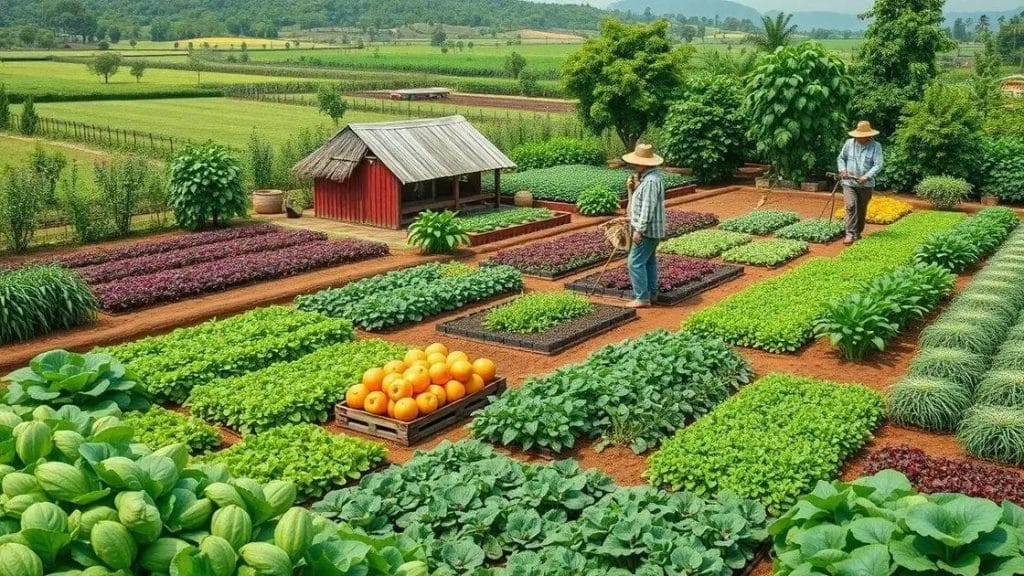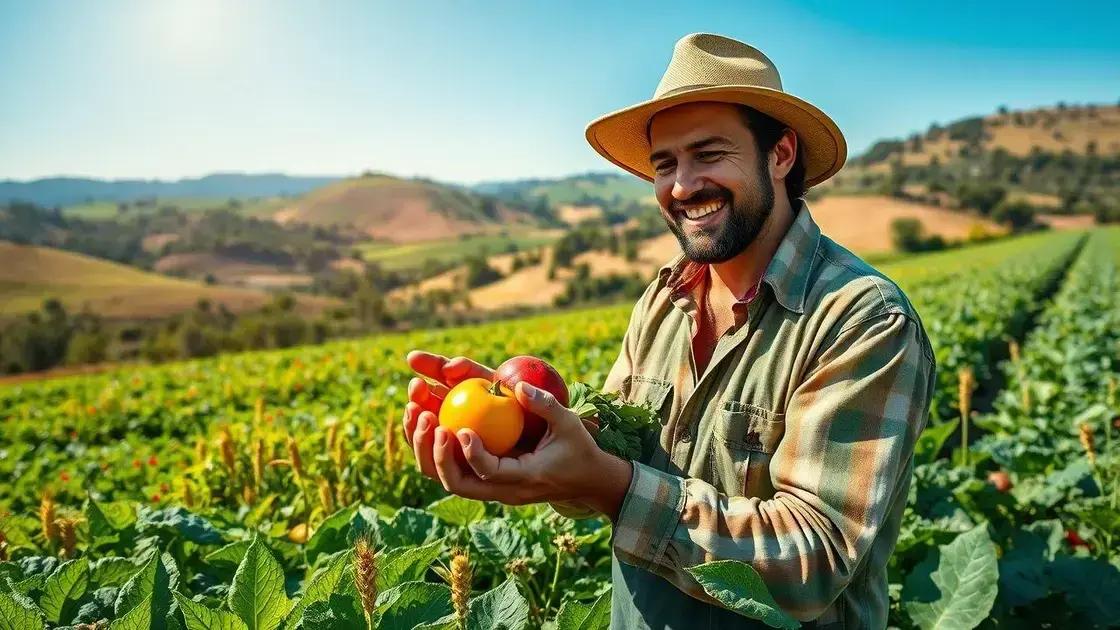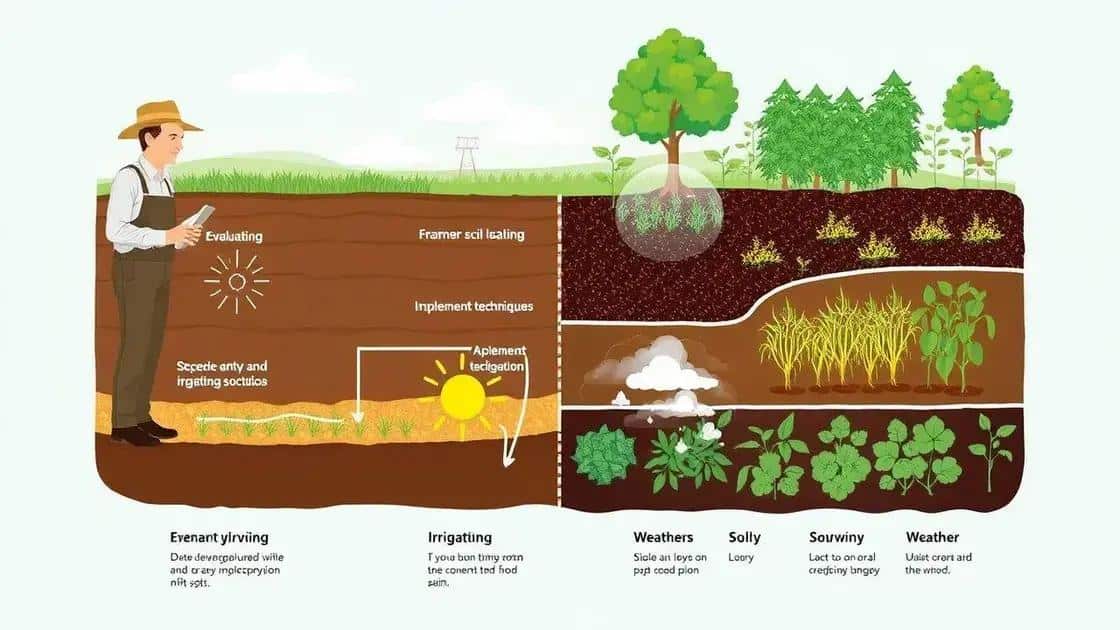Sustainable agriculture practices US: Your guide to greener farming

Anúncios
Sustainable agriculture practices in the US promote eco-friendly farming techniques that enhance soil health, reduce environmental impact, and ensure food security while benefiting local communities.
Sustainable agriculture practices US are increasingly important for preserving our environment while meeting food production needs. Have you ever wondered how these practices can benefit our planet and your local farm? Let’s dive into the ways they can shape a better future.
Anúncios
Understanding sustainable agriculture
Understanding sustainable agriculture is crucial in today’s world. It combines various techniques that promote the health of our planet. As we face challenges like climate change and resource depletion, exploring such practices offers solutions.
Key Principles of Sustainable Agriculture
This approach emphasizes the importance of preserving the environment. Farmers aim to enhance soil fertility, conserve water, and promote biodiversity. By working with nature, they can achieve better results.
Anúncios
- Soil health: Using cover crops and organic fertilizers to enhance soil life.
- Water conservation: Implementing drip irrigation and rainwater harvesting techniques.
- Biodiversity: Integrating different plant species to create a balanced ecosystem.
- Crop rotation: Changing crops seasonally to maintain soil nutrients.
Another significant aspect is reducing reliance on chemical inputs. Many farmers switch to organic methods, which involve the use of natural pesticides and fertilizers. This not only benefits the environment but improves the quality of food.
Community Impact
Sustainable agriculture also focuses on community engagement. By supporting local farmers, consumers can help create a resilient food system. This allows for fresher produce and promotes economic stability.
Additionally, community-supported agriculture programs enable consumers to become more involved. They can directly contribute to local farms, ensuring they receive fresh and nutritious food while supporting sustainable practices.
As we continue to learn about the benefits of sustainable agriculture, it becomes clear how vital these methods are for our future. By making informed choices, we can contribute to a healthier planet and society.
Benefits of sustainable practices

Benefits of sustainable practices in agriculture extend far beyond just increasing yields. They play a vital role in protecting the environment, enhancing food quality, and promoting the well-being of communities.
Environmental Benefits
By adopting sustainable practices, farmers can significantly reduce their impact on the environment. It helps in preserving biodiversity and minimizes pollution. Healthy soil practices, such as crop rotation and cover cropping, enhance soil fertility.
- Reduction of chemical runoff into water sources.
- Minimization of greenhouse gas emissions.
- Protection of wildlife habitats.
- Conservation of natural resources like water.
These practices are not just good for the planet; they also lead to healthier ecosystems. This results in better resilience against pests and diseases, benefiting farmers in the long run.
Improved Food Quality
Sustainable agriculture often leads to higher quality produce. When done right, it results in more nutritious food without harmful chemicals. Many consumers prefer the taste of organically grown fruits and vegetables.
These products are not only better for health but also for the community. Supporting local farmers who practice sustainability strengthens local economies. When consumers choose local produce, they contribute to a more resilient food system.
Additionally, sustainable practices provide a sense of connection to the land. By participating in community-supported agriculture, people can engage directly with their food sources. This connection enhances awareness about where food comes from and the importance of supporting sustainable methods.
Innovative techniques in sustainable farming
Innovative techniques in sustainable farming are transforming the way we grow food. These methods emphasize using resources wisely and minimizing environmental impact.
Precision Agriculture
This technique involves using technology to monitor and manage field variability in crops. Farmers utilize GPS and sensors to gather data, allowing them to apply water, fertilizers, and pesticides only where needed. This leads to better yields and decreases waste.
- Improved efficiency in resource usage.
- Reduction in chemical runoff.
- Higher crop quality and productivity.
- Cost savings on inputs.
Another innovative practice is vertical farming. This method allows crops to be grown in stacked layers, usually in controlled indoor environments. Vertical farms use less land and water than traditional farming methods. Moreover, they can produce food year-round, regardless of climate.
Agroforestry
Agroforestry combines agriculture and forestry to create more diverse, productive, and sustainable land-use systems. By integrating trees with crops and livestock, farmers can enhance biodiversity. This also helps in improving soil health and providing additional income through timber or fruit production.
Furthermore, practices such as integrating cover crops help maintain soil moisture and nutrients. This technique prevents erosion and enhances soil structure, allowing farms to be more resilient to climate change.
Through these innovative techniques, sustainable farming not only aims to increase food production but also works towards creating a healthier environment. By embracing these practices, farmers can lead the way in food security and sustainability.
Challenges and solutions in sustainable agriculture

Challenges and solutions in sustainable agriculture are essential to understand as we strive to make farming more eco-friendly. Many farmers face problems related to climate change, soil health, and economic pressures. Despite these challenges, there are effective solutions that can help.
Adapting to Climate Change
One major challenge is the unpredictable nature of climate change. Farmers must adapt to new weather patterns and extreme conditions. Sustainable practices, such as crop diversification, can help reduce risk. By planting a variety of crops, farmers can better cope with the changes.
- Utilizing drought-resistant crop varieties.
- Implementing efficient irrigation systems.
- Timing planting and harvesting with weather patterns.
- Enhancing soil health to retain moisture.
These methods improve resilience and ensure that farms can remain productive, even in adverse conditions.
Soil Health Issues
Another challenge is maintaining soil health. Overuse of chemical fertilizers can deplete soil nutrients and lead to erosion. Sustainable practices can restore and enhance soil quality. Techniques like cover cropping and no-till farming help build organic matter and improve soil structure.
Additionally, farmers can adopt integrated pest management to lower reliance on harmful chemicals. This approach promotes natural predators and minimizes chemical use, leading to healthier crops and ecosystems.
Economic pressures also pose a challenge for many farmers. Transitioning to sustainable practices often requires upfront investment. However, the long-term benefits, such as reduced input costs and higher-quality produce, can outweigh these initial expenses. Incentives from government programs and community support can bridge the financial gap.
FAQ – Frequently Asked Questions about Sustainable Agriculture
What is sustainable agriculture?
Sustainable agriculture is a farming approach that focuses on producing food without harming the environment, ensuring economic viability, and enhancing quality of life.
What are some benefits of sustainable practices?
Benefits include improved crop quality, reduced environmental impact, preservation of biodiversity, and stronger local economies.
How can farmers adapt to climate change?
Farmers can adapt by using crop diversification, efficient irrigation systems, and by adopting resilient practices that enhance soil health.
What innovative techniques are used in sustainable farming?
Innovative techniques include precision agriculture, vertical farming, agroforestry, and the use of cover crops to maintain soil health.





